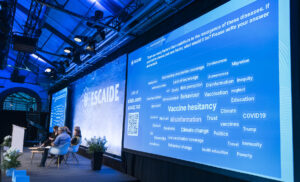In November 2024, BMJ Open Research Editor Dr. Artur Arikainen attended the latest European Scientific Conference on Applied Infectious Disease Epidemiology (ESCAIDE), organised by the European Centre for Disease Prevention and Control (ECDC).

The conference welcomed 800 attendees in person in Stockholm, Sweden, and over 3,100 online.
Kicking off the proceedings, the new ECDC Director Pamela Rendi-Wagner stressed the importance of developing international cooperation for upcoming health threats. She noted that Europe should be a stronger player in health security preparedness, including not only strategies to tackle detection and response, but also prevention.
Dr. Rendi-Wagner highlighted the need for trust in politics, medicine, science, and public institutions, as a loss of trust leads to problems like falling vaccine rates, which further lead to disease outbreaks. Indeed, the ECDC is working on new approaches based on behavioural science and awareness of social contexts in order to achieve better outcomes in engaging communities.

Read more in a recent news article from The BMJ on Dr. Rendi-Wagner’s perspective.
Prevention versus cure
One focus of the conference raised the question: should we focus more on preventing disease outbreaks in the first place? Prof Chris Dye from the University of Oxford presented on the ‘paradox of prevention’, where prevention is the right thing to do, yet we irrationally don’t do it. As humans, we tend to discount the value of the future when considering decisions in the present. However, there is a strong need to ensure early interventions in medicine and public health. The most effective approaches use regularly applied mechanisms – in other words we should move from reactive emergency responses to proactive, ‘always on’ systems that can be more easily scaled up in pandemics.
Read Prof. Dye’s recent co-authored editorial on preparation for H5N1 “bird flu” in our companion journal The BMJ.
Disease control in conflict
We learned of the unprecedented and tragic challenges in dealing with public health during times of conflict from Ihor Kuzin, Deputy Minister of Health for Ukraine. Conflict can disrupt access to medical care through damage or destruction of healthcare facilities, disruption to supply chains of medicines, and rises in injuries and infectious disease outbreaks. Resources and infrastructure that can be taken for granted in peacetime, such as clean water supply and sewage systems, may become scarce or absent. These challenges required swift and efficient solutions, such as mobilising medical resources, stockpiling of critical medicines, and expanding telemedicine provision.
An additional and sometimes overlooked outcome is the rise in mental health issues among both military and civilian populations, including post-traumatic stress disorder. This too extends to healthcare workers themselves, who require additional training to prepare them for work in crisis conditions.
One success story is the 2024 vaccination catch-up campaign for measles, mumps, and rubella (MMR) – over 93% of children aged 2-17 received their first MMR vaccine dose, and 88% received the second dose, despite the ongoing war affecting the country.

Read a recent opinion on this topic from the WHO in our companion journal The BMJ.
Surveillance and the next pandemic – ‘Disease X’
Five years since the first confirmed COVID-19 case, the world’s response to a pandemic has remained an important feature in conference sessions. Dr. Lieke van Alphen from Maastricht University described how high-throughput sequencing became widespread thanks to the pandemic, enabling detailed surveillance of the outbreak at regional and national levels
However, an important question remains: What will the next pandemic outbreak be?.
Dr Ana Maria Honao-Restrepo from WHO Switzerland, noted that over 1,650 pathogens could lead to the next pandemic. An audience poll suggested that influenza, specifically H5N1, is overwhelmingly believed to be the current most likely candidate.
One important point raised was that infectious diseases do not stop at borders. Therefore international cooperation is key to ensuring good outcomes. Challenges in planning for future disease outbreaks may include dealing with widespread misinformation, hesitancy towards vaccines, and even the impacts of climate change.

Diversity and inclusion in research and publishing
A satellite symposium brought to the fore the question of diversity and inclusion in research and publishing.
Dr. Shirin Heidari of the GENDRO project, which seeks to uncover gender biases in research, stressed that it is important to base healthcare decisions on facts not assumptions. She highlighted that scientific and medical research needs transparent and complete reporting, particularly when the concepts of sex and gender are sometimes incorrectly conflated. The SAGER guidelines co-developed by Dr. Heidari are now included in the recommended reporting guidelines at all BMJ journals.
Meanwhile, Dr. Gowri Gopalakrishna from Amsterdam UMC, co-author of the Cape Town Statement, presented the importance of equity – defined as ensuring fairness and justice by correcting for systemic disparities. She noted the underrepresentation of women and ethnic minorities in health research. Consequently, it remains important to include diverse teams to define research questions and run studies, with local community input too.

A lively question and answer session highlighted the need to move away from the flawed Impact Factor as a way to measure the quality of research, and for the need to focus on quality not quantity of publishing output – this has been the ethos of BMJ Open since launching in 2011. An alternative measure could take the form of altmetrics on each individual publication, showing the engagement of readers and news outlets.
—
In his closing remarks, ECDC Chief Scientist Dr. Piotr Kramarz remarked on the value of preparedness, building bridges across communities, and working across sectors of science, technology and politics. Most importantly of all, he underlined the importance of solidarity – remembering that we are all human in the end.
Next year’s ESCAIDE conference will be held on 19-21 November 2025, in Warsaw, Poland.
We encourage our readers to browse BMJ Open’s latest content offerings in infectious diseases, epidemiology, and a dedicated collection for HIV/AIDS.
—
Artur Arikainen, PhD is a full-time Research Editor for BMJ Open. This text was written without any assistance from AI.